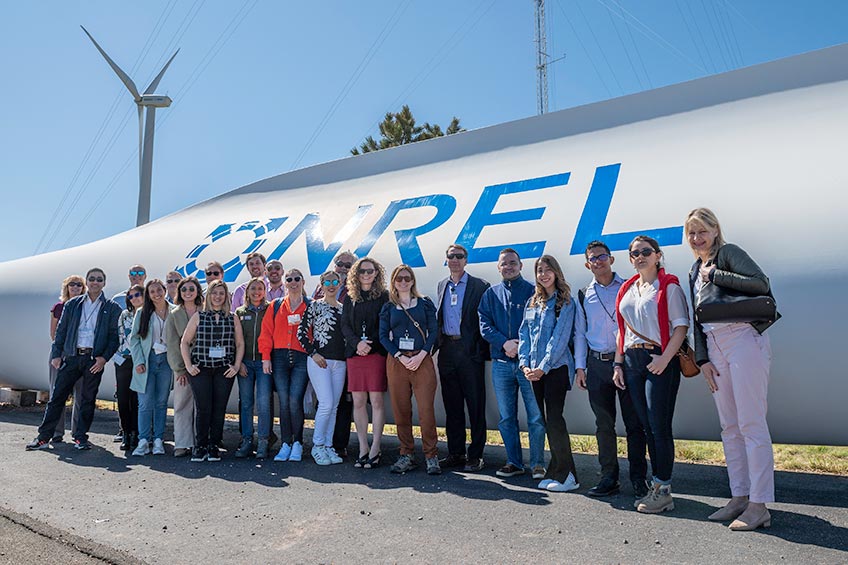NREL Is Helping Develop Colombia's Next Generation of Renewable Energy Leaders
Laboratory Is Building up Young Energy Leaders in Colombia Through Hands-on Training and Education

NREL provided a comprehensive tour of the National Wind Technology Center to the Colombia delegation.
While much of the National Renewable Energy Laboratory (NREL) campus sat quietly late on a Friday afternoon, one conference room was still bustling with activity. Nearly 20 international visitors sponsored by the United States Agency for International Development (USAID) were just wrapping up an action-packed, week-long site visit to NREL.
As part of the wrap-up discussion, Daniella Rough, a program manager in NREL's Accelerated Deployment and Decision Support center, and one of the principal organizers of the trip, asked the group what the most interesting part of their visit to NREL was. Almost in unison, they responded in Spanish with an enthusiastic "¡Todo!", or in other words, "All of it!".
The visiting group was a cohort of early-career energy sector leaders from Colombia who traveled to NREL's campus in May 2022 to tour the facilities, learn from NREL's experts, and collaborate in person after nearly three years of working together virtually. The cohort was composed of the 10 top-scoring and most engaged participants from the Young Leaders Variable Renewable Energy (VRE) Capacity Building program, as well as key project implementing partners.
Campus Visit Caps Off Years of Virtual Interaction
The "Young Leaders Program," for short, began with a 12-month comprehensive training course designed to ready Colombia's energy sector workforce to participate in the construction, operation, and grid integration of VRE projects. It was jointly led by the USAID Colombia mission with support from NREL, the United States Energy Association (USEA), and Tetra Tech, the implementing partner for USAID's Scaling Up Renewable Energy (SURE) program.
Public and private energy organizations throughout Colombia nominated employees to join the course, resulting in participation from more than 60 early-career professionals from over 20 organizations within the Colombian energy sector. While the program was originally meant to be held in person, the onset of the COVID-19 pandemic forced the implementing team to redesign the course into a virtual format.
"It worked out because we now have over 100 hours of recorded webinars focused on the needs, applications, and challenges in Colombia," Rough said. "Looking forward, we hope to replicate the capacity building program and continue to serve new actors who enter Colombia's energy sector."
The visit to NREL's campus not only rewarded the participants for their dedication throughout the course but was also an opportunity to finally meet, in person, many of the participants, experts, and coordinators who helped make the course a success.
"This visit is a celebration of what we were able to do to position these young leaders to have a vision of the great potential that renewable energy has, and the challenges and opportunities it presents, for Colombia," said Thomas Black, renewable energy lead at USAID Colombia.
Support and Analysis Provided Across Colombia's Energy Sector
The Young Leaders Program is just one piece of NREL's expansive project portfolio in Colombia. Engagement with the government of Colombia began in 2017, when NREL assisted with the design, preparation, and implementation of international renewable energy auction mechanisms for large-scale solar and wind energy resources and long-term power purchase contracts.
More recently, NREL is part of a team supporting efforts to rebuild the energy system on Providencia Island, decimated by Hurricane Iota in November 2020, with the goal of creating a more sustainable and resilient energy infrastructure to help Providencia withstand the effects of climate change. The technical assistance spans research, capacity expansion analysis, white papers, and technical assistance to inform an "Energy Master Plan" for Providencia Island and support integration of renewable energy resources at the distribution level.
NREL is also supporting the Colombian government on regulatory changes regarding hydrogen, offshore wind, and geothermal energy, as well as providing technical training materials to a similar workforce training program for indigenous communities in the La Guajira region of Colombia, where significant renewable energy development is being planned.
Technical Assistance for Action Plan Implementation
In between hearing from researchers across NREL and touring the laboratory's facilities, the cohort also presented progress on the action plans they developed as part of the course's capstone activity. The action plans are meant to apply the content received through the course to real-world energy questions participants were facing in their respective organizations. Each plan represents a different aspect associated with planning for the efficient integration of distributed energy resources and electric vehicles in Colombia. One of the participants and site visitors, Carolina Obando Anzalo, from Colombia's Comisión de Regulación de Energía y Gas, described how her group decided on the best topic for their action plan.
"We identified that one of the important things for electric mobility to work in Colombia was a review of the distribution code, so for our action plan we are doing some recommendations and documenting them to improve the distribution code and improve the implementation of distributed energy resources in our country," Obando Anzalo said.
Four of the action plans have received tailored NREL technical assistance over the last year to support implementation. They are currently being finalized, and results are expected in July 2022.
Demonstrating NREL's Value Internationally
"The most interesting aspect of the visit was seeing the great leadership NREL is exercising in the transformation of energy management in the United States and across the world," said Diana Marcela Orrego Vega, an energy regulation advisor at Grupo Energía Bogotá.
"I was pleased by NREL's willingness to share their knowledge and research in the development of renewable energies that support the energy transition," she said.
Overall, the site visit to NREL not only marked the culmination of the capacity building program, but it helped forge a strong cooperation going forward that will continue to support Colombia in its energy transition journey.
Last Updated May 28, 2025
